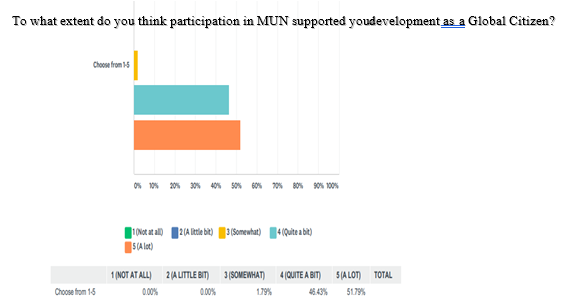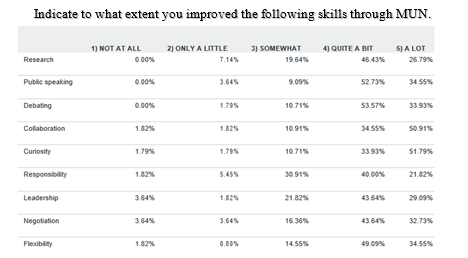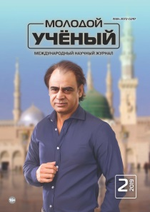UNESCO has always been concerned about Global Citizenship Education (GCE) and consequently many universities and schools are creating specific programs in order to find out the best way to develop international citizens. Instilling GCE provides many opportunities for the students to be successful in their future life. The goal of this research paper is to test the effectiveness of Model United Nations (MUN) in fostering global citizenship. Qualitative and quantitative methods were chosen as primary research for the purpose of comparing data with secondary source materials.
This study will contribute to improve education in Kazakhstan by providing information about teachers and students’ perception on the role of MUN in promoting Global citizenship. Also, this study can be beneficial for teachers who are looking for new active learning methods to teach their subject.
Keywords: Global citizenship, Model United Nations, Global issues, Taking action, Social responsibility
Introduction
By initiation of the President of Kazakhstan local schools are changing by implementing the best international practices. It is guided by NIS Uralsk school mission that teachers are aimed to enhance the intellectual and creative capacity of students realizing a global education.
In this global age humanity is struggling with a variety of problems such as poverty, pollution, health issues and ethnic conflicts. In order to fight with them the United Nations created Sustainable Development Goals. Along with these goals the Secretary-General in 2012 stated that ‘Education is more than literacy and it is also about citizenry’. It is an undeniable fact that we are not living isolated lives from the mutually dependent world and one thing that is happening in one country can affect another country. That is why, it is becoming increasingly necessary to raise students who have awareness of different global issues and skills to solve them (Basharir, 2017). We should be responsible to have active citizens who will actively participate in creating a safer, more humane and peaceful world. In order to create such a society, Secretary-General (2012) stated that teachers must foster global citizenship (Salah, 2018).
Even though global citizenship is quite a modern term, there is no consensus on its definition yet. OXFAM (2006) had created GCE program where it is written that global citizens are the individuals who are aware of global issues, respect diversity, can contribute to make a world equitable and sustainable place (Basharir, 2017). Julia Andrejewski (1996), a professor in the department of human rights, states is that students who have GCE are able to identify information from credible sources and evaluate them, formulate questions and analyze arguments (Andrzejewski & Alessio, 1998). Also, Burrows (2004) defines GC as knowledge and skills to understand cultural differences, for problems that arise when there is no tolerance for different perspectives (Basharir, 2017). UNESCO agrees (2015) that the aim for GCE is to develop and apply skills for critical inquiry, media literacy, problem-solving, negotiation and decision-making (Basharir, 2017). As it is written above, a global citizen is a person that has all the skills and knowledge necessary to live in 21st century properly.
Many universities and schools are concerned about preparing students for the real life and we are as well. We have realized that everything we teach at our lessons are identical with characteristics of global citizenship. Then, at our school we as a department have started to research active methods that will help us to develop critical thinking, research, reflection and communication skills as part of the subject curriculum.
Model United Nations (MUN) was chosen as an effective way to teach global citizenship. MUN is an academic simulation of the United Nations where students play the role of delegates from different countries and attempt to solve real-world issues with the policies and perspectives of their assigned country (Qatar MUN workshop, 2018, p.3). At present, more than 1,000,000 students around the world have participated in MUN conferences in countries around the world (United Nations Office on Drugs and Crime, 2018).
With our team we have decided to teach the rules and strategies of MUN during the second term of 2017–2018 academic year, as our subject program gives us freedom in pedagogical of approach. Students selected topic of Refugees and researched about this problem. After covering all main stages of MUN we organized first regional MUN conference at our school.
Teaching or promoting global citizenship is vital for schools for many reasons, but beyond that instilling global citizenship education provides the notion that humanity faces the same global issues which can be solved if people come together. Global citizens acknowledge global problems and understand that different people have different perspectives.
This is an issue because the subject (Global Perspectives and Project Work) which I am teaching requires teaching methods that are needed to enhance understanding of the concept of global citizenship. Prime goal of the paper is to test effectiveness of MUN in instilling Global citizenship among students. That is why; research work intends to investigate following questions:
‒ How do teachers and students understand the meaning of the ‘Global citizenship’?
‒ What kind of skills can GCE develop?
‒ What is the most effective way to teach and promote GCE?
The intended outcomes of the research work are to increase teacher’s understanding of the Model UN and raise students’ awareness on the topic of real-world skills.
Methods
As this research intends to define the role of MUN in promoting Global citizenship, it is highly important to opt for the most appropriate method. Therefore, it was decided to use a combination of quantitative and qualitative study. Mixed method gives a better understanding of the research topic than either types of methods used as standalone in so far as it builds on the strong sides of quantitative and qualitative data gathering (Creswell, 2012).
Mixed research method was conducted after the participation on Model UN conference at NIS Uralsk during the 2017–2018 academic year because we wanted to see their post-conference reflection.
The number of survey participants accounts for approximately a hundred people, which are Grade 11 students from NIS Uralsk, NIS Aktobe and other Uralsk local schools, who have participated at first Uralsk MUN conference. Besides this, there is no special target group, all respondents had lessons about the structure of MUN and member states. The survey was conducted via online medium.
Regarding interview, NIS Uralsk teachers who taught MUN for their Grade 11 students were chosen. Teachers were selected in order to know their point of view about the effectiveness of MUN in promoting global citizenship. Unstructured type of the interview is more suitable for this research work because it can offer a multifaceted picture of the situation.
Results
Survey information was collected from 100 people and under two thirds of them were females. Nearly a half of respondents comprised of 17–18 years of age and almost a third were teenagers between 14 and 16. Research was intended to investigate the importance of Model UN in fostering global citizenship.
Bar chart 1

According to primary research results it was revealed that Model UN was beneficial for students. As it was indicated by participating at Model UN conference students can gain content knowledge, be mature and self-confident, and improve public speaking, social and research skills. Students point out that participating in Model UN helped them to develop their skills in research, academic reading and writing and public speaking. Additionally, they developed characteristics like persuasion, collaboration and cooperation as they work with their fellow delegates to find solutions to important global issues. These are all skills they will need to be active global citizens and future leaders for Kazakhstan. Moreover, these skills will be useful in a variety of disciplines including History, English, Geography and Global Perspectives. Also, by participating in Model UN students will not only learn about UN bodies and member states, but also will develop the importance of dialogue, diplomacy, negotiation, and building consensus. These skills are fundamental in developing global citizens and future leaders.
Table 2

By results, teachers believe that MUN is the effective way of teaching as students represent a country with its own unique challenges, opinions and laws. As students represent their assigned country, they enjoy an opportunity of impassioned speeches, lively debate and active collaboration as they and their colleagues work together to develop and write resolutions designed to address the important issues. Students interact with diverse groups of people and understand better what is happening in the world and will make significant contributions for mankind. Another development in terms of skills is the ability of students to argue their point, to make strong counter-argument, to analyze and evaluate arguments, it will help them to have balanced views. When students represent their assigned country’s position ‘it is difficult to argue against what you believe in’.
Conclusion
According to OXFAM (2006), an Education system should be a main place to foster GCE, because they can motivate and inspire students to become actively involved in making a better world and it can be integrated with many subjects (Basharir, 2017). During the second term we tried to inculcate Model UN structure into the Global Perspectives subject curriculum. First experience was quite successful, and students come up for participation very responsibly. Throughout the second term students have researched their countries` policy about alternative energy. They not only learnt to write opening speeches but also write resolutions. Also, students learnt how to participate at Moderated and Unmoderated caucuses, so they were able to show their knowledge. The most difficult part for them was writing a resolution because it was very hard to find allies among countries, even if they are found; they had to negotiate with each other.
Educational institutions all over the world participate in the Model UN in order to find solutions to the global problems through discussion, negotiation and debate. Educating students through Model UN is beneficial for students and it encourages students to investigate various countries perspectives on particular issues and to work collaboratively to understand better views and attitudes other than their own (Hall, 2015).
By analyzing secondary and primary research materials, we have come to conclusion that developing global citizenship is vital and the best way to do it is through Model UN simulation. Global citizens acknowledge global problems and understand that different people have different perspectives. Global citizens respect diversity and accept the fact that actions that are carried out in one country affect another country. Instilling global citizenship education provides the notion that humanity faces the same global issues which can be solved if people come together.
Both teachers and students agree that Model UN helps them to learn about diplomacy, international relations, and the global issues. Throughout the participation on it they develop skills necessary for their future life including public speaking, debating, academic and writing skills, critical thinking, teamwork, leadership. Students who experienced Model UN simulation feel that they might be active global citizens and future leaders of Kazakhstan.
In conclusion, Model UN is a creative, active way to develop global citizenship that increases student’s awareness of global issues, provides an interesting approach to research on a variety of topics, unites students, bringing them together to solve global problems.
References:
- Asia-Pacific Regional Bureau for Education. (2017). Preparing Teachers for Global Citizenship Education. Bangkok, Thailand: UNESCO Asia-Pasific Regional Bureau for Education.
- Andrzejewski J. & Alessio J., Education for Global Citizenship And Social Responsibility.John Dewey Project on Progressive Education Monograph — August 1998. www.uvm.edu/~dewey
- BAŞARIR F. Examining the Perceptions of English Instructors Regarding the Incorporation of Global Citizenship Education into ELT*. International Journal of Languages’ Education and Teaching Volume 5, Issue 4, December 2017, p. 409–425
- Hall G. (2015), Developing Human Rights and Political Understanding through the Model United Nations Program: A Case Study of an International School in Asia. Ethos Vol 23, No 3, Term 3.
- Kang, R., Mehranian, Y., & Hyatt, C. (2017). Incorporating an image-based, multimodel pedagogy into global citizenship education. International Journal of Education & the Arts, 18(23). Retrieved from http://www.ijea.org/v18n23/
- Linyuan, G. (2014). Preparing Teachers to Educate for 21st Century Global Citizenship: Envisioning and Enacting. Journal of Global Citizenship & Equity Education, 4(1), 1–22.
- Model United Nations Institute. Retrieved from: http://bestdelegate.com/5-sports-tips-for-training-your-model-un-team/
- Memet K., Buket T., Fikriye Ö. Examination of Social Studies Curriculum and Course Books in the Context of Global Citizenship. Universal Journal of Educational Research 5(3): 472–487, 2017 http://www.hrpub.org DOI: 10.13189/ujer.2017.050319
- Michael A., Global Citizenship Education and the Development of Globally Competent Teacher Candidates., Journal of International Social Studies, v. 7, n. 2, 2017, pp. 20–59
- Pettit, Stacie K.; Albert, Craig D.; Walker, Juan; and Rychly, Laura (2017). «Young Citizens of the World Unite! A Case for the Model United Nations in Middle School Classrooms, «Middle Grades Review: Vol. 3: Iss. 2, Article 2. Available at: http://scholarworks.uvm.edu/mgreview/vol3/iss2/2
- Salah.R. Global Citizenship and Role of the United Nations: the Promise of the Early Childhood Peace Consortium. New Directions for child and Adolescent Development, No 159, spring 2018, published online in Wiley Online Library (wileyonlinelibrary.com). DOI 10.1002/cad.20231
- Suteau E. Taking Classrooms Global with Model United Nations conferences. Ethos: Vol 21, No 1, 2013.
- THIMUN. The Hague International Model United Nations Qatar. Qatar International Convention Center. VIII Annual Session Administrative Handbook. 22–25 January, 2019
- UNODC. The Doha Declaration: Promoting a culture of lawfulness. Model United Nations Workshop Participant’s handout. Vienna, 22–24 May, 2018
- UNESCO. (2017, March 10). UNESCO Forum on Global Citizenship Education provides a platform for innovative teaching. Retrieved from http://www.unesco.org/new/en/media-services/single-view/news/unesco_forum_on_global_citizenship_education_provides_a_plat/
- Weinstein, Mark D., «Students Hope to Continue Model U. N. Success» (2017). News Releases. 392. http://digitalcommons.cedarville.edu/news_releases/392







